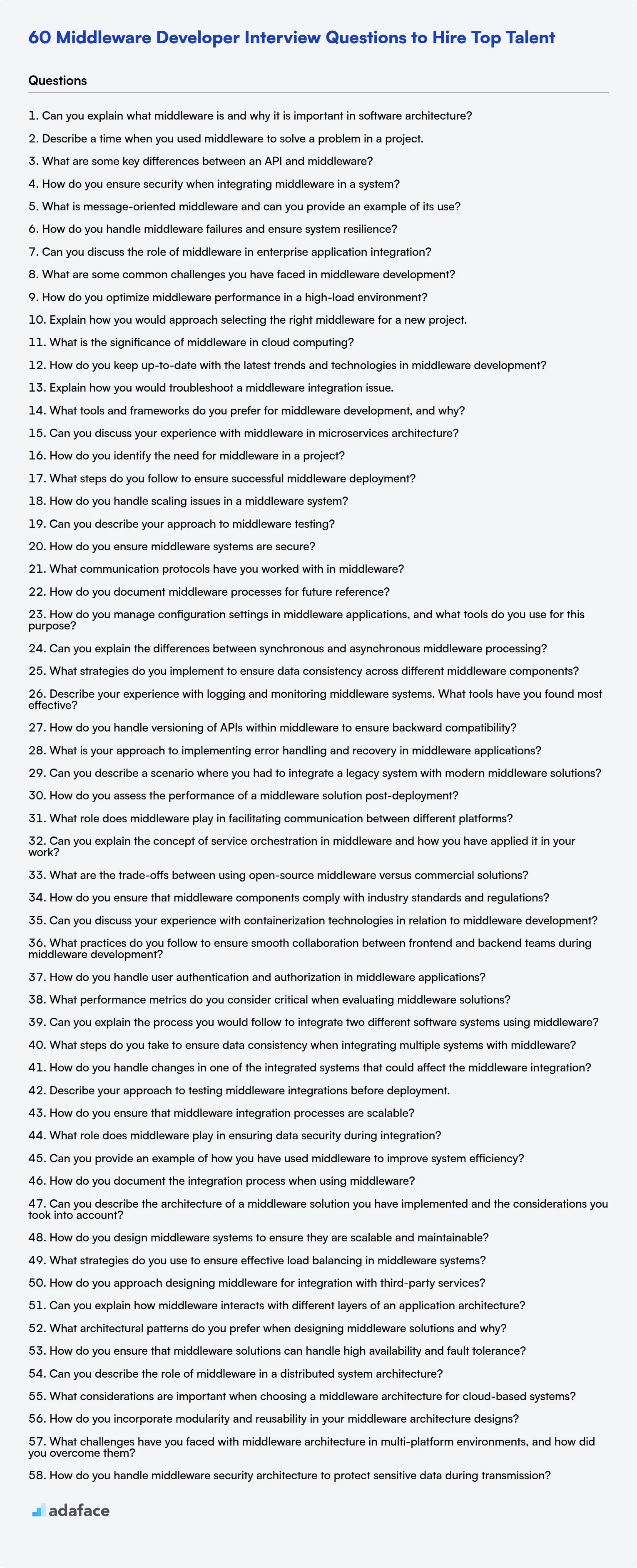Recruiting a skilled Middleware Developer can be challenging due to the intricate nature of middleware technologies and the critical role they play in system integration. By focusing on relevant skills, you’ll be better positioned to identify qualified candidates who can meet your organization’s technical demands.
In this blog post, we provide an extensive list of interview questions designed to evaluate candidates at varying expertise levels, from basic to advanced. This guide aims to empower you in fostering detailed, insightful discussions with potential Middleware Developer hires.
By leveraging this list, you can streamline your hiring process to ensure you choose the right candidate for your team. Pair these interview questions with our Docker online test to enhance the selection process further.
Table of contents
15 basic Middleware Developer interview questions and answers to assess applicants
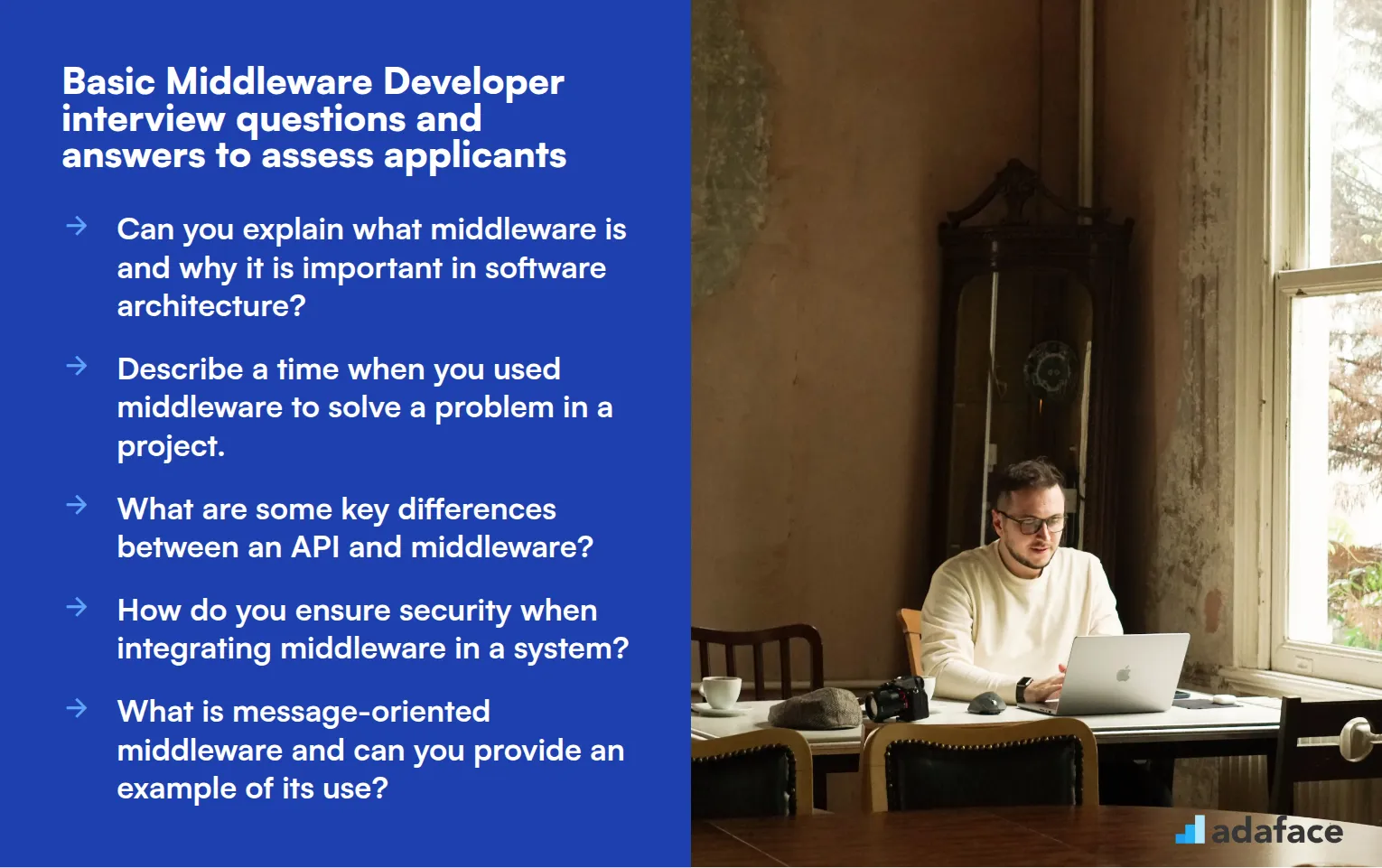
To effectively evaluate the core competencies of candidates applying for a Middleware Developer role, consider using these targeted interview questions. They are crafted to help you identify applicants who possess the necessary foundational skills and insights crucial for middleware development.
- Can you explain what middleware is and why it is important in software architecture?
- Describe a time when you used middleware to solve a problem in a project.
- What are some key differences between an API and middleware?
- How do you ensure security when integrating middleware in a system?
- What is message-oriented middleware and can you provide an example of its use?
- How do you handle middleware failures and ensure system resilience?
- Can you discuss the role of middleware in enterprise application integration?
- What are some common challenges you have faced in middleware development?
- How do you optimize middleware performance in a high-load environment?
- Explain how you would approach selecting the right middleware for a new project.
- What is the significance of middleware in cloud computing?
- How do you keep up-to-date with the latest trends and technologies in middleware development?
- Explain how you would troubleshoot a middleware integration issue.
- What tools and frameworks do you prefer for middleware development, and why?
- Can you discuss your experience with middleware in microservices architecture?
7 Middleware Developer interview questions and answers to evaluate junior developers
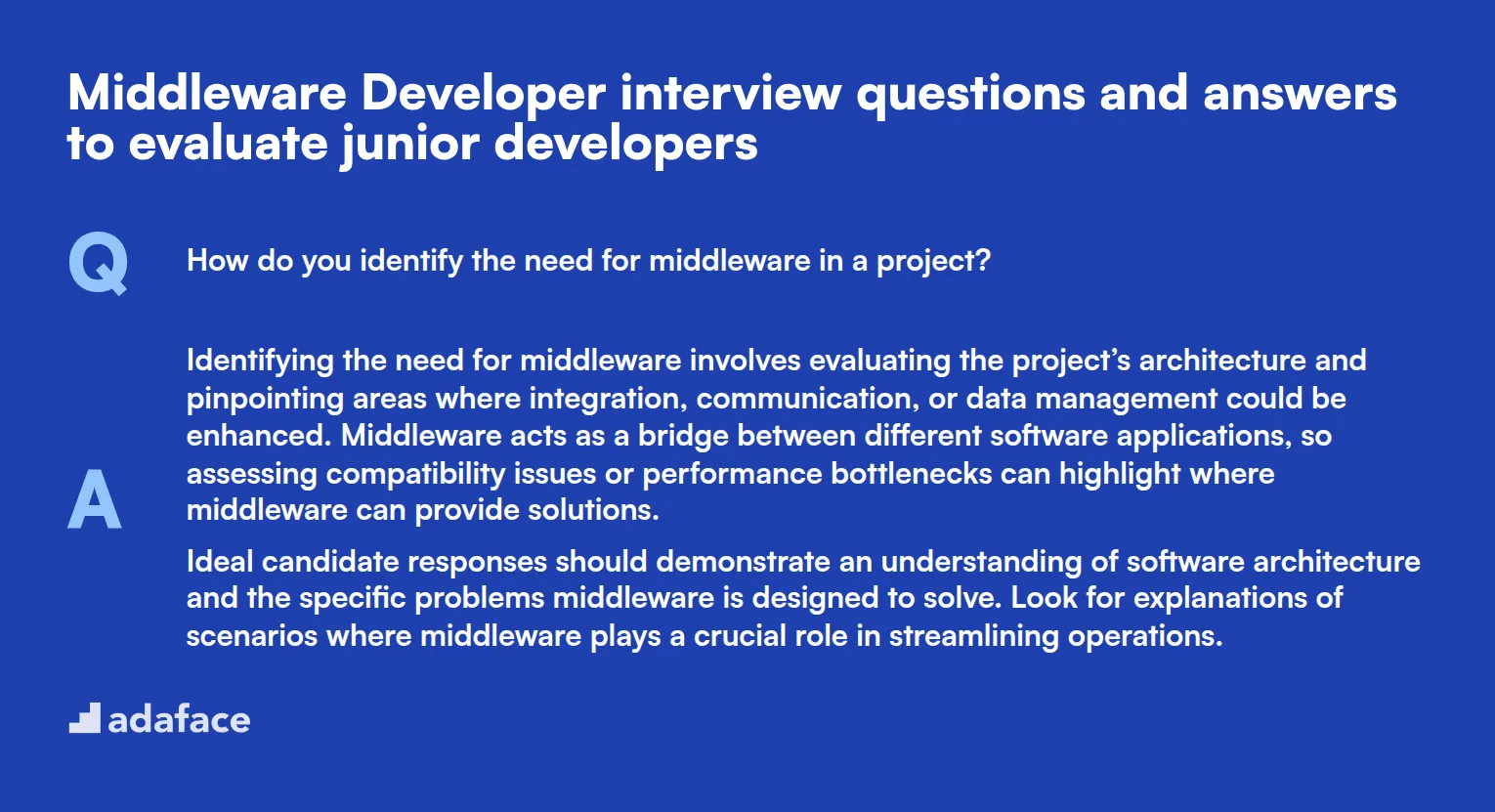
When it comes to evaluating junior middleware developers, having a robust set of questions is like having a trusty map in a treasure hunt. This list will guide you through assessing both foundational knowledge and problem-solving skills, ensuring you find the right fit for your team.
1. How do you identify the need for middleware in a project?
Identifying the need for middleware involves evaluating the project’s architecture and pinpointing areas where integration, communication, or data management could be enhanced. Middleware acts as a bridge between different software applications, so assessing compatibility issues or performance bottlenecks can highlight where middleware can provide solutions.
Ideal candidate responses should demonstrate an understanding of software architecture and the specific problems middleware is designed to solve. Look for explanations of scenarios where middleware plays a crucial role in streamlining operations.
2. What steps do you follow to ensure successful middleware deployment?
Successful middleware deployment starts with thorough planning and understanding of the system requirements. Key steps include assessing compatibility, configuring the middleware environment, conducting rigorous testing, and finally, implementing monitoring tools to ensure ongoing performance.
Candidates should emphasize the importance of testing and monitoring in deployment. Look for detailed descriptions of each step, and how they adapt these steps to different project needs.
3. How do you handle scaling issues in a middleware system?
Handling scaling issues in a middleware system requires a keen understanding of the system’s architecture and the demands on it. Techniques such as load balancing, caching, and optimizing resource allocation are crucial. Additionally, implementing automatic scaling solutions can help accommodate varying loads efficiently.
The best responses will highlight specific strategies like load balancing or caching and illustrate an understanding of when and how to apply these techniques. Look for practical examples or experiences that showcase their ability to effectively manage scaling challenges.
4. Can you describe your approach to middleware testing?
Middleware testing involves verifying that the middleware layer functions as expected and integrates seamlessly with other components. This includes unit tests, integration tests, and performance tests, ensuring that data is correctly routed and processed between systems.
Look for answers that show a structured approach to testing, incorporating different types of tests. An ideal candidate should mention the importance of continuous testing and automation in maintaining middleware quality.
5. How do you ensure middleware systems are secure?
Ensuring middleware security involves applying several practices such as encryption, authentication, and regular security audits. Additionally, keeping middleware components up-to-date with the latest security patches and configuring access controls are essential steps.
Candidates should emphasize the importance of proactive security measures. Look for examples of how they have implemented security protocols in past projects to safeguard data and systems.
6. What communication protocols have you worked with in middleware?
In middleware, common communication protocols include HTTP/HTTPS, MQTT, and WebSockets. Each protocol serves different purposes, such as HTTP/HTTPS for web services and RESTful APIs, or MQTT for lightweight messaging in IoT applications.
A strong candidate will not only list protocols but also explain their use cases and advantages. Look for their ability to select the appropriate protocol based on specific project requirements.
7. How do you document middleware processes for future reference?
Documenting middleware processes involves creating comprehensive guides that outline installation steps, configuration settings, and troubleshooting tips. Using standardized templates and ensuring regular updates to the documentation can make it a valuable reference tool.
Look for responses that emphasize clarity and accessibility in documentation. An ideal candidate will discuss the importance of maintaining up-to-date and user-friendly documents that aid in knowledge transfer.
18 intermediate Middleware Developer interview questions and answers to ask mid-tier developers.

To gauge the technical expertise of your candidates, use this list of intermediate Middleware Developer interview questions. These questions will help you assess their knowledge and problem-solving capabilities in real-world scenarios, ensuring you find the right fit for your team. For more information on roles and skills, check out our middleware developer job description.
- How do you manage configuration settings in middleware applications, and what tools do you use for this purpose?
- Can you explain the differences between synchronous and asynchronous middleware processing?
- What strategies do you implement to ensure data consistency across different middleware components?
- Describe your experience with logging and monitoring middleware systems. What tools have you found most effective?
- How do you handle versioning of APIs within middleware to ensure backward compatibility?
- What is your approach to implementing error handling and recovery in middleware applications?
- Can you describe a scenario where you had to integrate a legacy system with modern middleware solutions?
- How do you assess the performance of a middleware solution post-deployment?
- What role does middleware play in facilitating communication between different platforms?
- Can you explain the concept of service orchestration in middleware and how you have applied it in your work?
- What are the trade-offs between using open-source middleware versus commercial solutions?
- How do you ensure that middleware components comply with industry standards and regulations?
- Can you discuss your experience with containerization technologies in relation to middleware development?
- What practices do you follow to ensure smooth collaboration between frontend and backend teams during middleware development?
- How do you handle user authentication and authorization in middleware applications?
- What performance metrics do you consider critical when evaluating middleware solutions?
8 Middleware Developer interview questions and answers related to integration processes
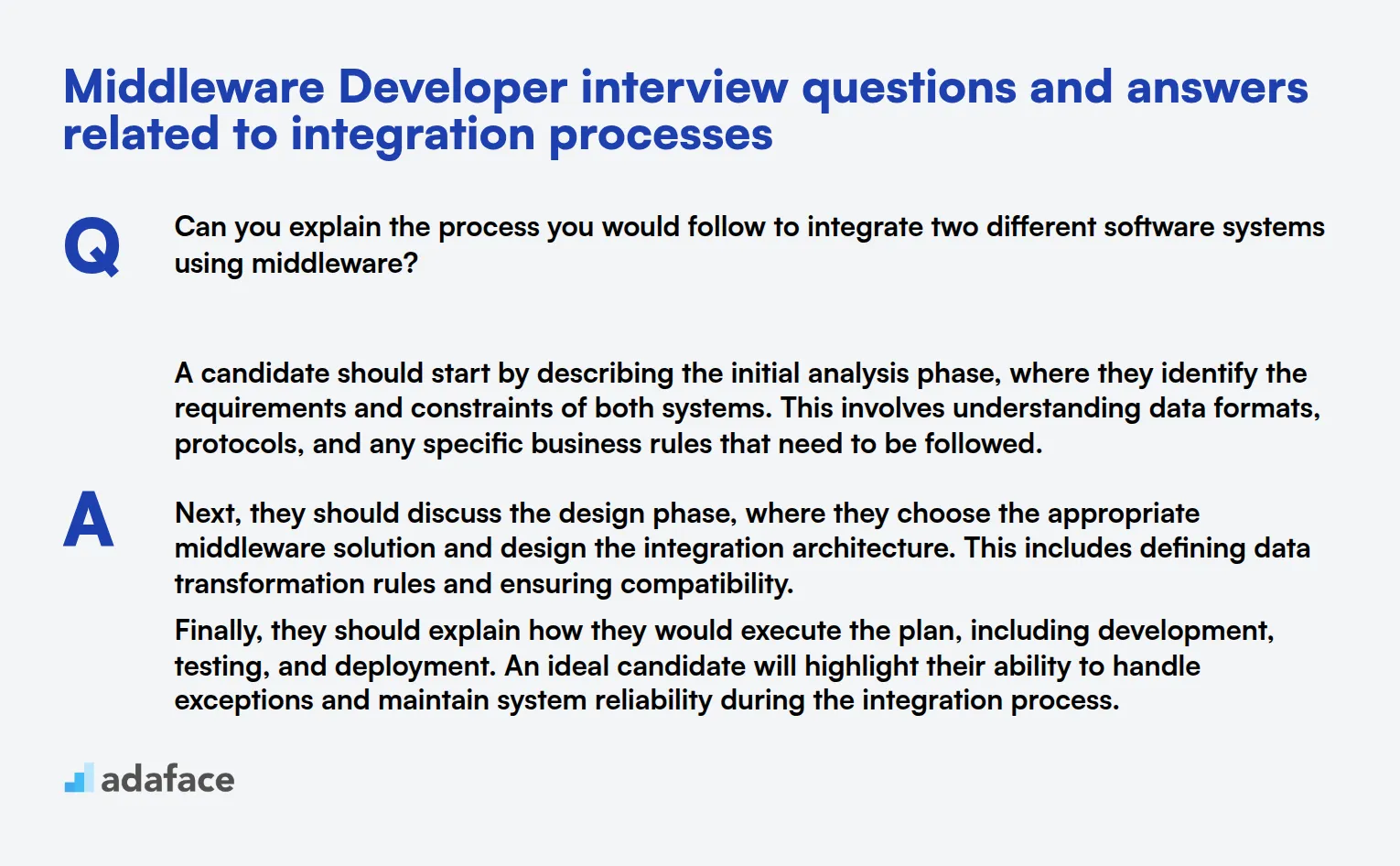
To ensure your candidates can effectively integrate systems and streamline processes, consider using these middleware developer interview questions. They are designed to uncover insights into their problem-solving skills and ability to manage complex integration tasks. Use these questions to gauge their understanding of integration processes, and ensure they have the right skills to tackle your middleware challenges.
1. Can you explain the process you would follow to integrate two different software systems using middleware?
A candidate should start by describing the initial analysis phase, where they identify the requirements and constraints of both systems. This involves understanding data formats, protocols, and any specific business rules that need to be followed.
Next, they should discuss the design phase, where they choose the appropriate middleware solution and design the integration architecture. This includes defining data transformation rules and ensuring compatibility.
Finally, they should explain how they would execute the plan, including development, testing, and deployment. An ideal candidate will highlight their ability to handle exceptions and maintain system reliability during the integration process.
2. What steps do you take to ensure data consistency when integrating multiple systems with middleware?
Ensuring data consistency is crucial in system integration. A candidate should mention using transactional mechanisms provided by the middleware to ensure atomicity and consistency of data.
They may also discuss implementing proper data validation and error handling strategies to catch and rectify data inconsistencies early in the process.
Look for candidates who emphasize the importance of thorough testing and monitoring to maintain data integrity throughout the integration lifecycle. They should be aware of how to utilize middleware features to manage data consistency.
3. How do you handle changes in one of the integrated systems that could affect the middleware integration?
Candidates should explain how they monitor for changes in the integrated systems and assess the potential impact on middleware integration. They should mention conducting impact analysis and updating integration mappings or configurations as needed.
They might also talk about setting up alerts and notifications for any changes detected, ensuring prompt responses to maintain system stability.
Strong candidates will demonstrate experience in version control and documentation practices to manage changes efficiently, ensuring smooth integration even when systems evolve.
4. Describe your approach to testing middleware integrations before deployment.
A solid approach involves creating a thorough test plan that covers all integration points and scenarios, including edge cases. Candidates should emphasize the use of automated testing tools for regression testing.
They should discuss how they simulate real-world data and environments to ensure the middleware handles various input conditions correctly.
An ideal candidate will showcase their ability to perform end-to-end testing and validate that the integrated systems communicate as expected. They should also highlight how they use testing feedback to refine and optimize the integration.
5. How do you ensure that middleware integration processes are scalable?
Candidates should highlight their experience in designing middleware solutions that can grow with increased demand. They might talk about using load balancing and clustering techniques to distribute the workload efficiently.
Another strategy could include selecting middleware technologies that support horizontal scaling and ensuring that the integration architecture can handle additional resources as needed.
Look for candidates who understand the importance of monitoring system performance and making data-driven decisions to optimize integration scalability. They should also be familiar with the skills required for middleware developer.
6. What role does middleware play in ensuring data security during integration?
Middleware acts as a secure bridge between different systems, ensuring that data is transferred safely. Candidates should mention the use of encryption and secure transport protocols like HTTPS or SSL/TLS.
They should also discuss implementing authentication and authorization mechanisms to control access to sensitive data during integration.
An ideal candidate will emphasize the need for regular security audits and updates to keep the middleware secure against evolving threats. They should understand the broader implications of integrating security best practices into middleware solutions.
7. Can you provide an example of how you have used middleware to improve system efficiency?
Candidates should provide a specific scenario where they leveraged middleware to streamline processes, reduce redundancy, or enhance performance. This might involve consolidating data from multiple sources into a single system.
They should explain the challenges faced, the middleware solution implemented, and the outcome achieved in terms of improved efficiency or cost savings.
Look for candidates who can clearly articulate the impact of their middleware solution on the overall system performance, demonstrating their ability to use middleware as a strategic tool for optimization.
8. How do you document the integration process when using middleware?
Documentation is key to maintaining and evolving integration solutions. Candidates should describe creating comprehensive documentation that includes architecture diagrams, data flow charts, and configuration details.
They should emphasize the importance of keeping records up-to-date with any changes or updates in the integration process.
An ideal candidate will highlight their use of documentation tools and practices that facilitate easy access and understanding by all stakeholders involved. They should ensure that the integration process is transparent and easily manageable.
12 Middleware Developer interview questions about system architecture
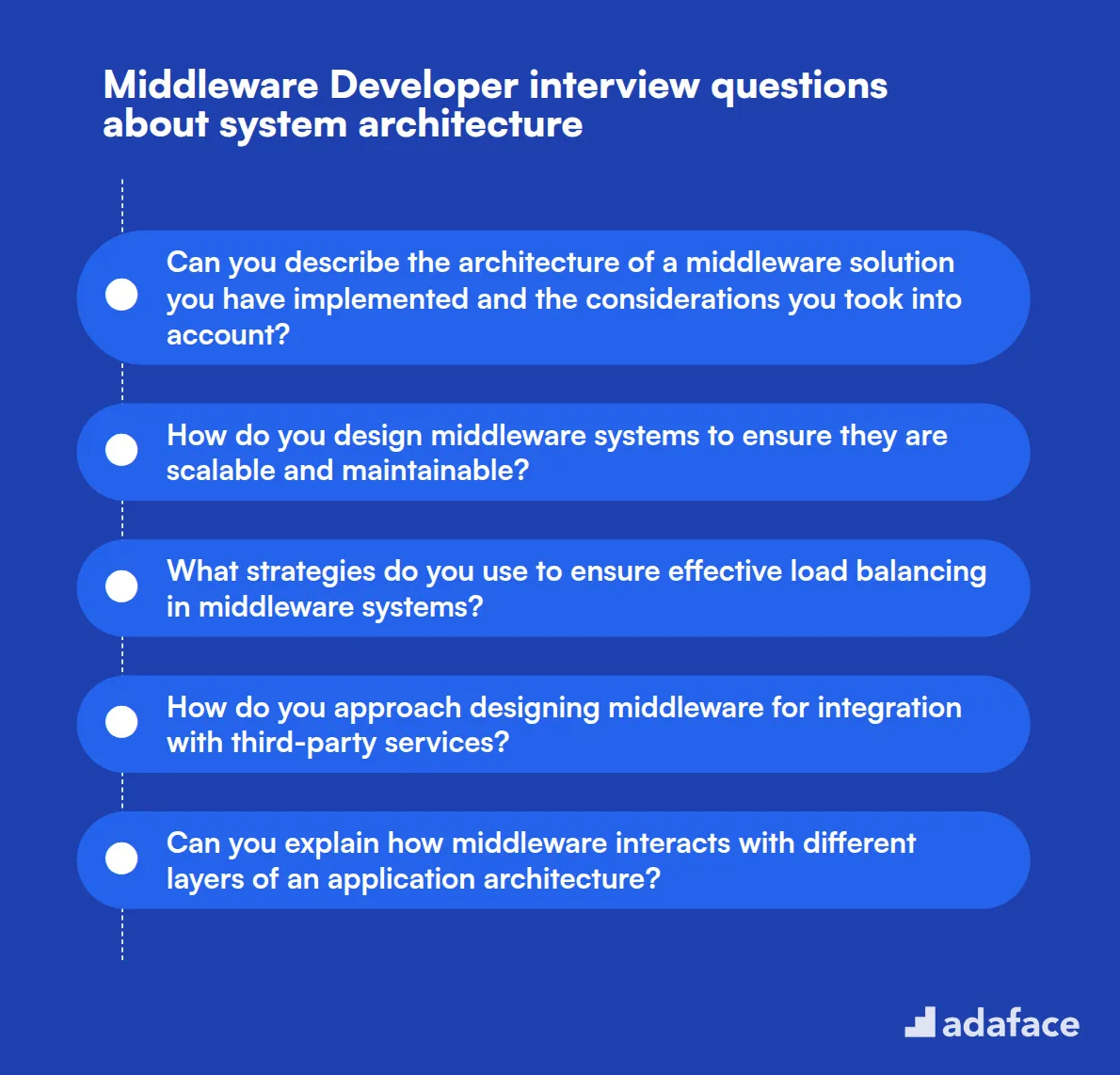
To ensure your candidates have a solid grasp of system architecture, explore these middleware developer interview questions. These will help you gauge their ability to design and implement middleware solutions effectively.
- Can you describe the architecture of a middleware solution you have implemented and the considerations you took into account?
- How do you design middleware systems to ensure they are scalable and maintainable?
- What strategies do you use to ensure effective load balancing in middleware systems?
- How do you approach designing middleware for integration with third-party services?
- Can you explain how middleware interacts with different layers of an application architecture?
- What architectural patterns do you prefer when designing middleware solutions and why?
- How do you ensure that middleware solutions can handle high availability and fault tolerance?
- Can you describe the role of middleware in a distributed system architecture?
- What considerations are important when choosing a middleware architecture for cloud-based systems?
- How do you incorporate modularity and reusability in your middleware architecture designs?
- What challenges have you faced with middleware architecture in multi-platform environments, and how did you overcome them?
- How do you handle middleware security architecture to protect sensitive data during transmission?
Which Middleware Developer skills should you evaluate during the interview phase?
In the interview process, it can be challenging to evaluate every aspect of a candidate's skill set in one sitting. However, focusing on a few key skills can provide insight into their potential as a Middleware Developer. Here are the core skills you should consider assessing during interviews.

API Development
To gauge a candidate's proficiency in API development, consider using an assessment test that covers relevant concepts and best practices, like our REST backend engineer assessment.
In addition to testing, targeted interview questions can uncover a candidate's familiarity with API development. A well-structured question can provide both insights and a discussion opportunity.
Can you explain the difference between REST and SOAP APIs and provide a scenario where one would be preferred over the other?
Listen for a clear understanding of both types of APIs and their specific use cases. The candidate should articulate why one might be chosen over the other based on factors such as compatibility, ease of use, and specific project requirements.
Data Integration
An assessment test focusing on data integration techniques can help filter candidates who understand how to manage and manipulate data across platforms. Consider utilizing our ETL online test for this purpose.
You may also want to ask questions that delve into a candidate's approach to data integration challenges.
What methods do you use to ensure data integrity during the integration process?
Look for responses that demonstrate an understanding of data quality checks, error handling, and validation processes. Candidates should cite practical experiences and solutions they've implemented.
Middleware Technologies
To assess this skill, consider using a technical test that covers various Middleware technologies. If you're looking for a structured approach, our Apache NiFi online test could be a great fit.
Moreover, targeted questions can provide insights into a candidate's practical experience with these technologies.
Can you describe a situation where you used a specific Middleware technology to solve a problem?
Pay attention to the candidate's ability to clearly explain the problem, the choice of technology used, and the results achieved. This will help you gauge their hands-on experience and problem-solving skills.
Hire Top Middleware Developers Using Adaface
If you're aiming to hire someone with middleware skills, it's important to ensure they truly possess these skills. Verifying expertise in middleware domains is key to building a strong development team.
One of the most effective ways to do this is by using specialized skill tests. Consider utilizing our tests such as Apache Tomcat, MuleSoft, and Kubernetes to accurately assess candidates' proficiency.
Once the tests are completed, you can easily shortlist the top applicants and invite them for interviews. This will ensure you focus your time on candidates who already demonstrate a high level of skill.
To take the next step, head over to our sign-up page to start your hiring process. Alternatively, explore our detailed online assessment platform to see how we can help you find the perfect fit for your team.
Apache Tomcat Test
Download Middleware Developer interview questions template in multiple formats
Middleware Developer Interview Questions FAQs
A Middleware Developer should be skilled in integration processes, system architecture, and have a good understanding of various middleware technologies.
Middleware Developers enable communication and data management between different software applications, facilitating seamless integration and functionality.
Middleware acts as a bridge, enabling communication and data exchange between different applications within a system architecture.
Assessing a Middleware Developer's skills ensures they can effectively handle integration challenges and contribute to efficient software system operations.
A common challenge is ensuring seamless integration and communication between diverse software applications to prevent system bottlenecks.
Interview questions help in evaluating a candidate's practical knowledge, problem-solving skills, and ability to handle real-world middleware integration scenarios.

40 min skill tests.
No trick questions.
Accurate shortlisting.
We make it easy for you to find the best candidates in your pipeline with a 40 min skills test.
Try for freeRelated posts
Free resources




